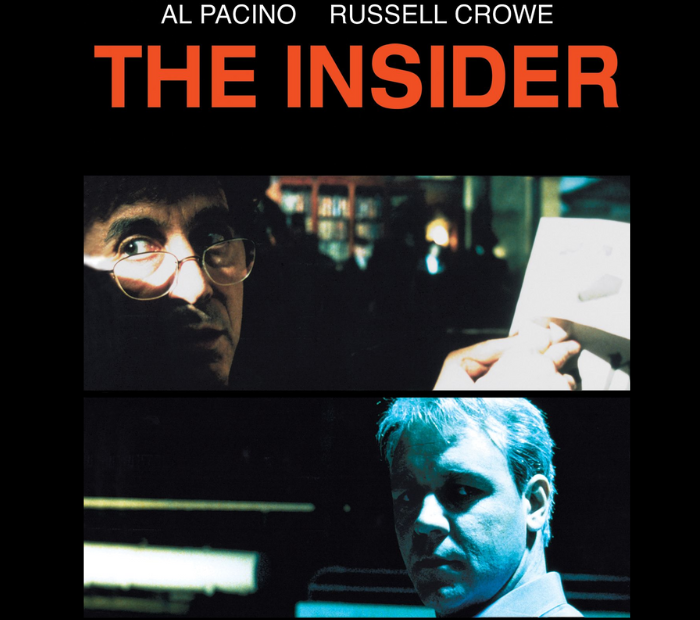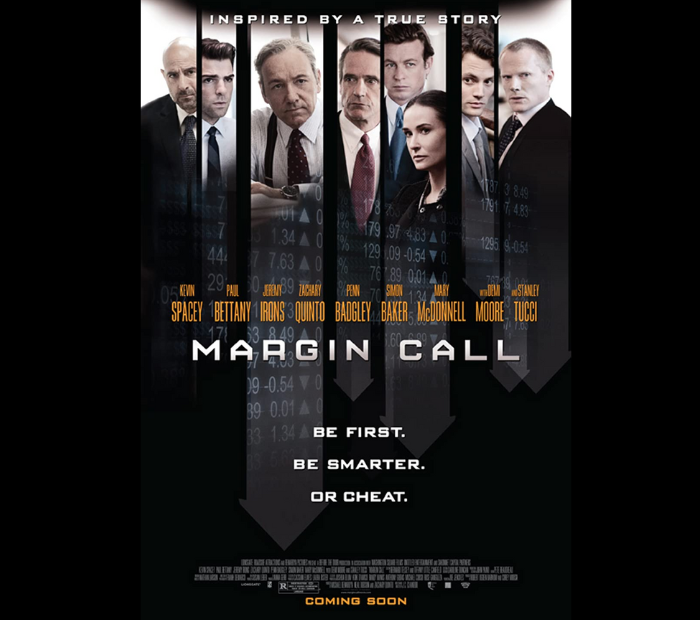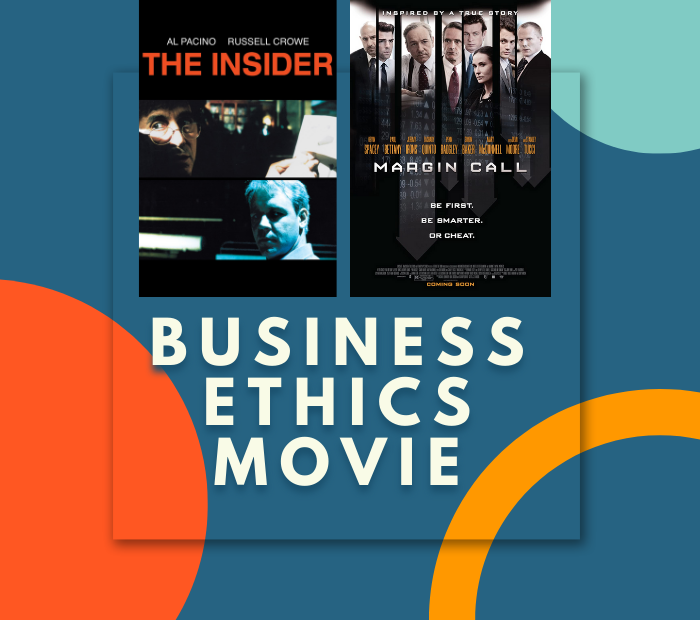One great movie about business ethics is “The Insider” (1999), directed by Michael Mann and starring Al Pacino and Russell Crowe. The film is based on the true story of Jeffrey Wigand, a former executive at a tobacco company who becomes a whistleblower and reveals the truth about the harmful effects of cigarettes. The movie deals with important ethical issues such as corporate responsibility, media ethics, and personal integrity. It shows how corporations can put profits ahead of people’s health and how individuals can make a difference by standing up for what is right, even in the face of great personal risk.

Another movie that explores business ethics is “Margin Call” (2011), directed by J.C. Chandor and featuring Kevin Spacey and Jeremy Irons. The film takes place over the course of 24 hours during the 2008 financial crisis and follows a group of employees at a large investment bank as they discover that the firm’s assets are worth less than its liabilities. The movie raises important questions about the morality of the financial industry and the responsibilities of those who work in it. It shows how greed and short-term thinking can lead to disastrous consequences and how individuals have to make difficult ethical decisions in order to do what is right.

Both “The Insider” and “Margin Call” are powerful films that offer a thought-provoking look at business ethics and the challenges that individuals face when they try to do the right thing in a complex and often ruthless corporate world.
Read More: Implications of Business Ethics in Different Areas of Activities
Review of “The Insider” (1999)
“The Insider” is a powerful and thought-provoking film that explores complex ethical issues in the tobacco industry and the media. The film is based on the true story of Jeffrey Wigand, a former tobacco company executive who becomes a whistleblower, and Lowell Bergman, a producer for the television news show “60 Minutes” who helps him expose the truth about the tobacco industry. The film features outstanding performances by its lead actors, Al Pacino as Bergman and Russell Crowe as Wigand, who both bring depth and nuance to their characters. The chemistry between them is palpable, and their relationship forms the emotional core of the film.

Director Michael Mann has crafted a visually stunning film, with moody lighting and atmospheric shots that create a sense of tension and suspense. The film also features a powerful and haunting musical score by composer Lisa Gerrard, which adds to the emotional impact of the story. The film’s exploration of ethical issues is nuanced and complex, with no easy answers or clear-cut villains. The tobacco industry executives are portrayed as ruthless and calculating, but the film also suggests that the media is complicit in perpetuating their lies by failing to report the truth. The film raises important questions about the role of the media in informing the public, as well as the responsibility of corporations to act in the public interest.
Review of “Margin Call” (2011)
“Margin Call” is a gripping and thought-provoking film that examines the ethical issues surrounding the financial industry and the 2008 financial crisis. The film takes place over a 24-hour period and follows the employees of a fictional Wall Street investment bank as they try to navigate the fallout from a risky financial strategy that has put the entire company in danger. The film features a talented ensemble cast, including Kevin Spacey, Jeremy Irons, and Zachary Quinto, who all deliver excellent performances that bring their characters to life. The chemistry between the actors is palpable, and the dialogue is sharp and insightful, with moments of tension and drama that keep viewers engaged.

Director J.C. Chandor has crafted a visually stunning film, with sweeping shots of New York City and the Wall Street skyline that create a sense of grandeur and power. The film also features a haunting and evocative musical score by composer Nathan Larson, which adds to the emotional impact of the story. The film’s exploration of ethical issues is nuanced and complex, with no easy answers or clear-cut villains. The characters grapple with the morality of their actions and the responsibility they have to their clients and the public. The film raises important questions about the role of the financial industry in society and the consequences of prioritizing profit over ethics.
- Business professionals and students: Those who work or study in the field of business may be interested in watching films that explore the ethical dilemmas and challenges that arise in corporate environments.
- Advocates for social responsibility: People who are passionate about promoting social responsibility and accountability in the business world may find business ethics movies to be a powerful tool for raising awareness and sparking important conversations.
- Critical thinkers: Individuals who enjoy thought-provoking and intellectually stimulating stories that challenge their assumptions and beliefs may be drawn to films that explore complex ethical issues.
- Fans of drama and suspense: Business ethics movies often have compelling storylines, with elements of drama and suspense that can keep audiences engaged and entertained.
Ultimately, anyone who is interested in exploring the moral complexities of corporate culture and the impact of business decisions on individuals and society may find business ethics movies to be a fascinating and thought-provoking viewing experience.
- Increased awareness of ethical issues: Watching movies that explore the ethical dilemmas and challenges of the business world can help viewers become more aware of the moral complexities of corporate culture and the impact of business decisions on individuals and society.
- Enhanced critical thinking: Business ethics movies often require viewers to think deeply and critically about complex issues, which can help to sharpen their critical thinking skills and ability to evaluate ethical situations.
- Improved decision-making: Watching business ethics movies can also help viewers to develop a stronger sense of personal ethics and moral principles, which can improve their ability to make ethical decisions in their own lives.
- Inspiration to take action: Some business ethics movies may inspire viewers to take action and become advocates for social responsibility and accountability in the business world.
- Greater empathy and understanding: Business ethics movies often feature complex characters and situations that can help viewers to develop a greater sense of empathy and understanding for others, including those who face difficult ethical decisions in the workplace.
In summary, watching business ethics movies can be a thought-provoking and engaging way to explore complex ethical issues, enhance critical thinking skills, and develop a stronger sense of personal ethics and values.
- Over-simplification of complex issues: Some business ethics movies may simplify complex ethical issues in order to create a clear hero vs. villain narrative, which can give viewers a false sense of the complexity of these issues.
- Unrealistic portrayals of the business world: Some movies may portray the business world as more corrupt or unethical than it really is, which can create a negative and inaccurate view of the industry as a whole.
- Inaccurate or biased information: Some business ethics movies may be based on true events or real companies, but may present a biased or inaccurate portrayal of the events or individuals involved.
- Negative impact on business reputation: Movies that paint the business world in a consistently negative light can contribute to a negative public perception of the industry, which can have a negative impact on businesses and their employees.
- Over-emphasis on personal responsibility: While personal responsibility is an important aspect of business ethics, some movies may overemphasize individual responsibility while downplaying the role of external factors such as organizational culture and structural issues in shaping ethical behavior.
It is important to keep in mind that movies are a form of entertainment and may not always be completely accurate or comprehensive in their portrayal of complex issues. It is important to critically evaluate the information presented in these movies and seek out additional sources of information and perspectives to develop a well-rounded understanding of business ethics.
- They tackle important ethical issues: Both films explore complex ethical issues that are relevant to the business world, such as corporate responsibility, media ethics, personal integrity, and the morality of the financial industry.
- They are based on true events: Both films are based on real-life events, which makes them more impactful and gives them a sense of authenticity.
- They have compelling storylines: Both films are well-crafted and engaging, with compelling storylines that keep viewers interested and invested in the characters and their ethical dilemmas.
- They have strong performances: Both films feature outstanding performances by their actors, with Al Pacino and Russell Crowe in “The Insider” and Kevin Spacey and Jeremy Irons in “Margin Call” delivering standout performances that bring their characters to life.
- They encourage critical thinking: Both films require viewers to think deeply and critically about complex ethical issues, which can help to improve their critical thinking skills and ability to evaluate ethical situations.
Therefore, “The Insider” and “Margin Call” are powerful business ethics films because they combine important ethical issues with compelling storytelling and strong performances, encouraging viewers to think deeply and critically about complex ethical issues in the business world.
Written by
Email: [email protected]

